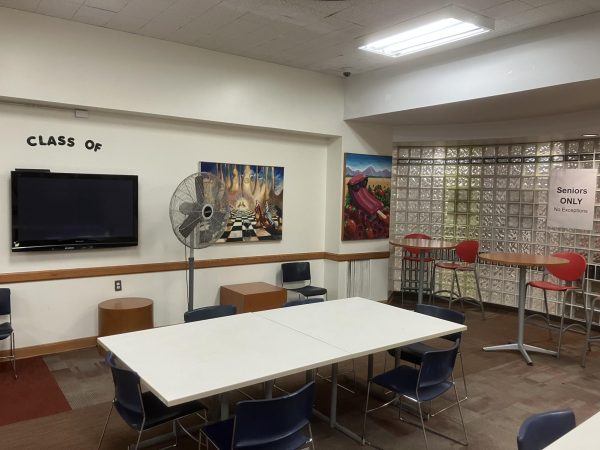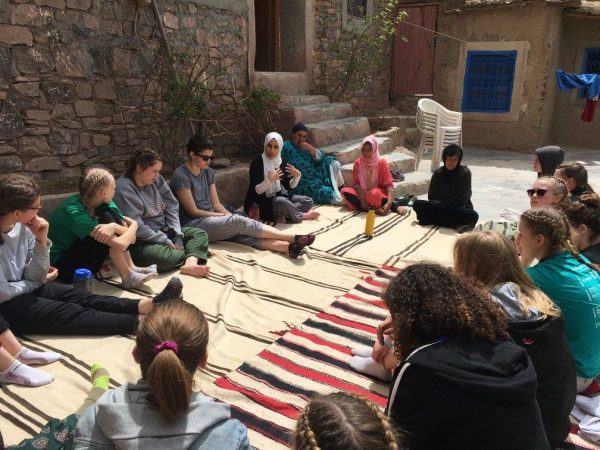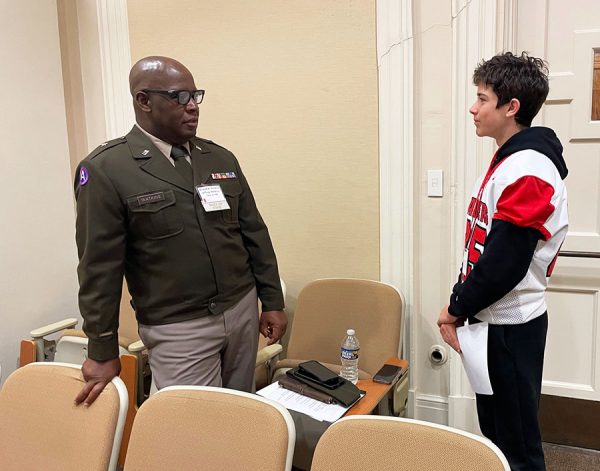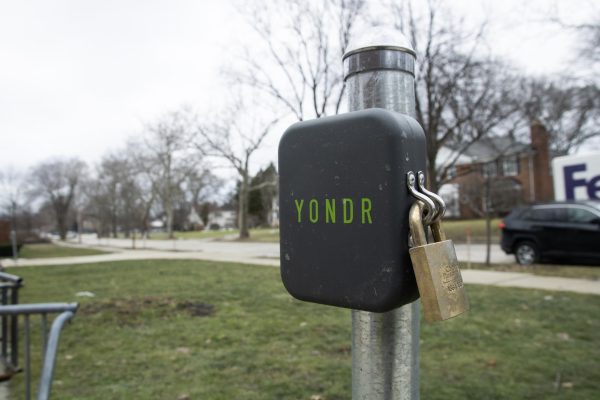‘For 20 years, I bore equal responsibility for what happened, but I no longer do’
Full text of victim statement read at former IB Diploma Programme Director Timothy Mitchell’s sentencing hearing
I met Mr. Mitchell on the first day of my junior year of high school. He was my American history teacher, and I was 15 years old. I loved history, so when I found myself with some free time one afternoon, I stopped by his classroom to ask about doing an extra credit project and we wound up talking for more than an hour. We found we had a lot in common, and he seemed like a really nice guy, so in the weeks that followed I’d often stop by his room to chat.
Eventually I was going to see him almost every day. Often times, I’d stay until long after the school day ended. I had friends my own age, but I also spent a lot of time alone. I was an only child, my parents were divorced, and my mom worked long hours. I was largely responsible for getting myself to and from school, for making my own breakfast, lunch, and often dinner. Instead of going to an empty home, I’d frequently stay at school as long as I could, talking with an adult who was willing to give me time and attention, and who seemed to truly understand me. We talked about music, movies, history, politics, baseball, travel. Sometimes he’d give me rides home from school, even though I lived well out of his way. I started babysitting for his children.
It’s not surprising that I developed a crush on him, although I kept it secret because I knew it was silly. In retrospect, I’m sure he suspected it, though. He started telling me personal details about his life and would sometimes bring up inappropriate topics. He told me that outside of school I could call him by his first name. I always struggled with that—with calling a teacher by his first name—but I did it even though it felt uncomfortable. Toward the end of that school year he took me to an Indians game. I knew it was unusual, but mostly I thought it was really cool that he wanted to spend time with me.
During my senior year, when I was 16 years old, I decided to tell him I had a crush on him, not because I thought anything would come of it, but because I hoped he would tell me I was being ridiculous, and that would dissuade me from thinking about it any longer.
That’s what he should have done. He should have told me, perhaps, that he was flattered, but that it was inappropriate. He should have told me that I could no longer spend time alone in his classroom. He should have told me that I couldn’t babysit his kids anymore, that he couldn’t give me rides home anymore. He should have apologized if anything he had done—talking to me about intimate details of his life, making sexual comments, taking me to a baseball game—had inadvertently contributed to my feelings.
That’s what he should have said.
Instead, he told me that he had thought about me in a similar way. He was quick to add that nothing more could happen between us, but he had opened a door when I had expected him to close it.
Still, I tried to believe him when he said there could never be anything more between us, even when he continued to use innuendos in our conversations, possibly even more than he had before. We would continue to talk about our feelings, and instead of telling me that nothing could happen between us, he’d say that nothing should happen, leaving open the possibility that it might.
He gave me many reasons why it shouldn’t. There would be legal ramifications for him. He’d lose his job and his family. He might go to jail. There would be long-term emotional effects for me: He pointed out that he had far more life experience than I did, and that someday I would wind up hating him for it.
Being a teenager who thought she knew everything, I was sure he was wrong. I also knew it was ridiculous to think our relationship could ever grow into something more, and I was confused that he kept bringing it up. I was trying to forget it and move on, but he kept pulling me back.
Finally, I demanded that he tell me nothing more would ever happen between us. He refused. I kept asking, practically begging him to put an end to whatever was developing between us, but he wouldn’t. Instead, he laughed at me.
After that, I decided to stay away from him. I didn’t go to his classroom and I stopped babysitting his children. But after a while, it seemed like maybe things would be okay. I thought we could pretend everything was fine, nothing was awkward, and we could be friends again. Yes, he still made highly inappropriate comments to me, and asked very personal questions that no teacher should, but I shrugged them off. I convinced myself his interest in me was innocent, even if his actions suggested otherwise.
At the end of my senior year, he took me to another Indians game. I didn’t think it would be any different than the first time we went to a game together. He would pick me up, we’d watch the game, he’d take me home. I thought we were just two friends going to a baseball game. I had no idea that later that evening, my life would change. I had no idea that what would happen that night would culminate with us sitting in a courtroom more than twenty years later.
He bought me a beer, and I drank it. He brought pot because a week or two before, I had tried it with a friend of mine for the first time. I had told him about it and he congratulated me. I guess he saw this as an opportunity to give me some more experience. Then he took me to the Art Museum. Even at that point, I still had no idea what was going to happen. We’d had some kind of conversation alluding to sex, but I was confused and thought we were just joking around. I had no idea what he really had in mind.
I didn’t say no. I was a willing and even eager participant. I was also drunk and high and a student and half his age.
A few months later I would accuse him of having taken advantage of me. His response was to remind me that he had warned me I’d feel that way. I had to admit he was right. He had warned me, and I accepted that. If I was hurt, I reasoned, I had no one to blame but myself.
That’s part of the reason why, for twenty years, I thought that because I agreed to it, I got what I deserved.
Except now I have the life experience he said I lacked at the time. He had convinced me that we were equals, that I was capable of making decisions with the same level of discernment. I can see now that there was a tremendous power imbalance between us. The fact that I felt weird calling him by his first name, even after he had sex with me, should have been an indication of that.
I can see now that I wasn’t nearly as grown-up or mature as I thought I was. I can see now that even though I wanted an intimate relationship with him, that doesn’t mean it should have happened.
I can see now that he didn’t just give me beer and pot because he was “cool” or because I could handle it. He gave it to me so I would relax and let my guard down.
I can see now that his warnings about how I would later regret this were not intended to be altruistic, but were intended to make me feel guilty and embarrassed about what happened. He wanted me to keep his secret, and the best way to do that was to make me believe that what happened between us was my fault.
Now I know that teenagers don’t always want or do what’s best for them. That’s where it’s up to adults to step in and at least try to steer them in the right direction. That’s not what he did. The fact that he warned me I’d be hurt doesn’t make things better; it makes them worse. He knew the damage it would cause, but that didn’t stop him from taking advantage of me.
For 20 years, I bore equal responsibility for what happened, but I no longer do. He was the adult. He had the responsibility to act like one. It was his job, literally, to look out for my best interest.
Even with that knowledge, I almost didn’t come forward. I knew it would be a grueling process and I didn’t want to go through it. I also worried about the other people it would affect. I worried about hurting the school and its current students, about hurting the community, about hurting his family, even about hurting him. It would be easier to stay silent, but something kept nagging at me. I looked to friends, family, and my therapist for advice but still didn’t know what to do. Finally, I turned to another former high school teacher of mine. I thought that because she had been in a similar position as Mr. Mitchell—a teacher who had been close to me when I was a teenager—she would be able to provide some clarity and would be able to tell me what I should do.
I traveled to Cleveland to tell her in person what had happened. I thought maybe she would shrug it off. Maybe she would tell me this kind of thing happens all the time and is no big deal and not worth reporting, and then I wouldn’t need to worry about it anymore. In fact, I almost hoped that’s what would happen. Instead, she was shocked, horrified, and furious that a teacher would have done this to me. I recognized that her reaction of anger and disgust was the one a teacher should have. I realized that although she and Mr. Mitchell were both teachers who had cared about me, only one of them was interested in protecting me.
She told me she couldn’t tell me what to do, but that as a teacher herself, she was required to report it. This terrified me because I still didn’t know if I wanted it to be reported. But I also couldn’t ask her to violate her professional duties in order to protect someone who had violated his.
When the police contacted me, they said it was up to me whether I wanted to pursue the matter. I could have said no, but at the same time I wondered about other students he might do this to, and other students he might have already done it to over the past 20 years.
I knew that by staying silent, by keeping my promise to him that I’d never tell, he still controlled the situation, and I didn’t want that anymore. I knew that opening an investigation might indeed hurt him, the school, and the community, but ultimately the onus of that would be on him, not on me. Any repercussions were his to bear, not mine any longer.
Coming forward has been extremely painful, but it has also been somewhat therapeutic and has helped me achieve some amount of closure. Still, the effects aren’t over; two decades of living under a delusion takes its toll on a person.
Until I started therapy, I hadn’t realized how our relationship had continued to affect me on a daily basis. I’ve been able to work through some of the repercussions, but this experience did shape my life in significant and, in some cases, irreversible and detrimental ways.
I’m working to let go of the feelings of guilt and responsibility that I have carried for 22 years. I am working on coming to terms with the feelings of fear and intimidation that occurred from my first sexual encounter occurring with a teacher twice my age. Because of this inappropriate relationship, I had trouble forming normal relationships afterward. I sought out much older men because I thought that’s the “type of person” I was, or what I was “supposed to do.”
I’ve suffered panic attacks over what should be normal situations. When I was visiting friends and having coffee in Shaker Square, I had to leave early because I was so scared that Mr. Mitchell would show up. I had to step out of my son’s middle school orientation because the video about “inspirational teachers” triggered so much pain and sorrow about my teacher who betrayed his position of trust. I had an anxiety attack at the informational meeting about my son’s class trip to Washington, D.C., when I learned there would be no parent chaperones, just teachers.
I’m not sure I will ever be able to fully trust my children’s teachers; in fact that mistrust is likely to increase as my children reach the age I was when these events occurred. I worry that I won’t be able to recognize if a teacher crosses boundaries with my children, or that I will overreact to situations that aren’t problems at all.
I’m working through the realization that I missed out on a normal high school experience because I spent so much of my junior and senior years hanging out with an adult instead of with kids my own age.
A couple weeks ago Shaker Heights High School held its 100th Homecoming celebration. I saw people posting photos of alumni events, holding signs and wearing Shaker t-shirts, and it actually hurt. I want to be proud of my high school and proud to be from Shaker, but I can’t. My experience was so tainted, I feel like an outsider now. Those celebrations and t-shirts are meant for other people, not for me. I feel like I don’t even have a high school anymore.
The defendant’s actions stole my innocence and caused me to grow up more quickly than I should have. Instead of protecting me and looking out for my best interests, as a teacher should, he took advantage of me for his own benefit. I don’t know how long it will be before I feel completely healed.
All this said, Mr. Mitchell was wrong about one thing: I don’t hate him. I’m angry with him. I’m sad and hurt and disappointed, but I don’t hate him. I didn’t come forward out of spite or vengeance, but out of a need for closure and justice. I don’t want him to go to jail; I just want to make sure he will no longer be in a position to influence students, and losing his teaching license will help accomplish that.
I need to thank the people who have helped me throughout this process. I want to thank the prosecutor for his hard work and dedication, and for answering all of my many questions.
I want to thank the detectives at the Shaker Heights Police Department. Before I spoke with the police, I had assumed they would be gruff and dismissive and would discourage me from pursuing the case. Nothing could have been further from the truth. The detectives were kind and compassionate, they made me feel safe and believed, and they communicated extensively with me every step of the way. All victims of sexual assault deserve to work with officers as compassionate as they were.
I want to thank my husband, who keeps telling me he feels helpless to give me the support I need, but who has done more than he knows just by giving me the space I’ve needed to complete this chapter of my life.
I want to thank my best friend, who has traveled hundreds of miles three times in this past year to stand by me while I reported this to the police, when I testified in front of the grand jury, and to be here today. I absolutely could not have faced this on my own, and she has been my rock.
Finally, I want to thank the teacher I reported this to last year, for the support she’s shown me through this process, for doing the right thing, and for reminding me how a truly admirable teacher should behave.






